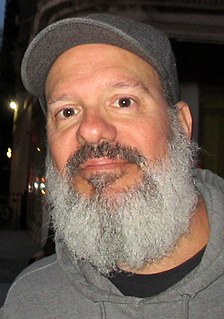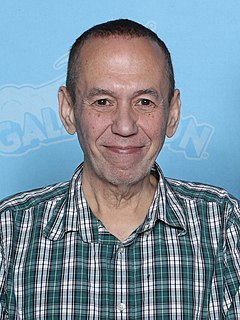A Quote by David Cross
I'll think of the idea and then I'll write something down, then within that there will be a joke or two which is the original thing which I thought was funny.
Related Quotes
When you start witnessing something without thought, there is no obstruction for absorbing the knowledge about that thing because there is no thought. It's complete absorption which takes place. And then it manifests. This is how the Divine Power works within us. So with our gravity, what we do is to touch that depth within us, which can carry the Divine Power and manifest.
If a comedian tells a joke that you find funny, you laugh. If he tells a joke you do not find funny, don't laugh. Or you could possibly go as far as groaning or rolling your eyes. Then you wait for his next joke; if that's funny, then you laugh. If it's not, you don't laugh - or at very worst, you can leave quietly.
Writing is the great skill, the creative skill. The acting is more an interpretative skill. And the thrill for me is the moment when I think of something. And then the challenge is how to get that funny idea to work in terms of the structure and that kind of thing, which is - and that's what I really love doing.
When I first started looking at Twitter, I followed people like Steve Martin, who will just write the funniest non sequiturs now and then, which I thought was really fun. That's kind of the road I've taken. Every now and then, something comes into your mind and you put it out there. It's very innocuous. I think it's kind of fun.
You have weak artificial intelligence, which is a robot or a computer system that follows a list of protocols and it's like yes/no answers that can be as complex as you want, and then you have strong A.I., which is basically like a human, like something that can think up a thought that's never been thought up or paint a painting or write a poem.
If a comedian tells a joke that you find funny, you laugh. If he tells a joke you do not find funny, dont laugh. Or you could possibly go as far as groaning or rolling your eyes. Then you wait for his next joke; if thats funny, then you laugh. If its not, you dont laugh - or at very worst, you can leave quietly.
Another problem of fragmentation is that thought divides itself from feeling and from the body. Thought is said to be the mind; we have the notion that it is something abstract or spiritual or immaterial. Then there is the body, which is very physical. And we have emotions, which are perhaps somewhere in between. The idea is that they are all different. That is, we think of them as different. And we experience them as different because we think of them as different.
Usually, the way I write is to sit down at a typewriter after that year or so of what passes for thinking, and I write a first draft quite rapidly. Read it over. Make a few pencil corrections, where I think I've got the rhythms wrong in the speeches, for example, and then retype the whole thing. And in the retyping I discover that maybe one or two more speeches will come in. One or two more things will happen, but not much.
I turn sentences around. That's my life. I write a sentence and then I turn it around. Then I look at it and I turn it around again. Then I have lunch. Then I come back in and write another sentence. Then I have tea and turn the new sentence around. Then I read the two sentences over and turn them both around. Then I lie down on my sofa and think. Then I get up and throw them out and start from the beginning.
Writing is the basis of all, because creating something that didn't even exist before is like taking an empty canvass. It is a wonderful thing to make something out of nothing. You've got an empty page, you've got an idea, and then you start typing and that is the most thrilling thing of all. And then if it becomes a movie or something else that's a plus, but the original writing of it is what's very exciting.
Everyone's [ me, Iain Cook and Martin Doherty] equally involved in all the writing. Normally we'll start with a sample or a drumbeat, or a synth sound or something like that, and that will spark the initial idea. And then we'll write an instrumental sketch of a song, and then we put on a nonsense vocal melody, which is always my favourite bit because it obviously sounds amazing.



































